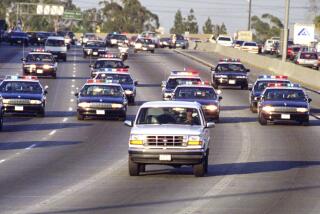Most important thing on TV this year could be this Super Bowl PSA
A few years ago, my husband wanted to call directory assistance, but accidentally dialed 911. “Oh, sorry,” he said when the dispatcher answered, and he hung up.
Five minutes later, a police officer arrived at our door. Richard explained what had happened and the officer nodded and asked to come in.
“Is your wife here?” he asked.
I had no idea why any of this was happening; I was reading in our bedroom and suddenly there was police officer standing in the doorway asking if everything was all right.
“Yes,” I answered, startled.
He asked if we had children, and when we called them, asked them the same question. He was calm and friendly, but he scanned our faces carefully before wishing us a good night. The whole thing took less than five minutes.
Richard was impressed; he thought the officer was making sure we all weren’t being held against our will by an intruder.
“No,” I said. “He thought it might have been a domestic violence call.”
For a few minutes, my husband was speechless. “Me?” he said finally. “Us?”
The No More public service ad scheduled to run during this year’s Super Bowl game may be the single most important thing on television this year. For a few short and highly disturbing moments, the largest television audience in America will be reminded that domestic violence continues to be an enormous problem and that it occurs in all sorts of homes, among all sorts of people.
There is no actual abuse shown in the ad; indeed, there is no action at all. While a camera pans through a seemingly empty and very comfortable home, an exchange is heard between an emergency dispatcher and a woman who also seems to have made a mistake—when the male dispatcher asks her the nature of the emergency, she proceeds to order a pizza.
Her voice is fairly calm as she details the toppings, but when he becomes a tiny bit impatient she asks “How soon can you get here?”
Based on an actual exchange reported by an emergency dispatcher, the conversation turns. The man catches on and begins asking her questions to which she can answer “yes” or “no,” including “Are there any weapons in the house?”
Her tone remains mostly conversational, but when he asks if she can stay on the line, she says no and “see you soon” and hangs up.
The camera, meanwhile, continues to move, now capturing the dented wall, the broken glass, the overturned furniture.
This is clearly a woman in crisis, afraid to openly call the police, but clever enough to reach out for help under the guise of ordering a pizza. This is obviously a woman who has been abused before.
Domestic violence, like most violent crime, has declined in recent years and that is not accidental. Since the late ‘60s, feminists and others, including many men, have fought to end domestic battery by increasing awareness, by funding shelters, educational programs, and demanding prosecution and new legislation - including the Violence Against Women Act of 1994.
Law enforcement officers, like the one who came to our door, have grown increasingly sensitive to the crime. Men, too, have spoken out, including those who have perpetrated, and in many cases, experienced abuse.
Beginning in the 1970s, a collective rejection of battering entered the popular culture. It became the center of films as diverse as “Fried Green Tomatoes,” “Sleeping with the Enemy” and a wide array of television movies and series.
The second season of “Maude” opened with Walter getting drunk and giving Maude a black eye. “The Burning Bed” turned Farrah Fawcett into a serious actress. I still remember the 1978 film “Battered,” which followed three women suffering at the hands of their partners, mainly because one of the women was played by “Little House on the Prairie’s” Karen Grassle, her abusive husband by “MASH’s” Mike Farrell.
Lately, however, the issue seems sidelined in our narratives. HBO recently aired the excellent documentary “Private Violence,” but while violence, against women and in general, increases on our screens, it is mostly non-domestic sexual assault, serial killing and the barbaric acts of war. Even historical dramas shy away from depicting the kind of marital abuse that was, depending on the time period, legal and common.
It’s as if we think the problem no longer exists.
Which makes the No More ad, and others like it that have been running during fall and winter NFL games, even more important.
Are they a PR move by an organization beset by many image problems, including domestic violence? Of course they are, but who cares? The rates of abuse may have declined but they are still unacceptable: 1 in 4 women will experience violence at the hands of an intimate partner.
How many women do you know? How many female friends does your daughter or son have?
A year after I graduated college I worked as a volunteer on a domestic abuse hotline. The women I spoke with were mostly seeking information for themselves or a “friend.” The only real-time crisis I dealt with involved a woman who had locked herself in the bathroom; the sound of yelling and pounding frightened me way more than it seemed to frighten her.
Listening to the woman in the Super Bowl ad ask for help by ordering a pizza, I remembered we had been told in training: No one calls a hotline the first time they are hit. So no matter how bad the situation might seem, we volunteers were not to panic.
“These women know better than you how to survive the situation, “ our advisor told us, “because they’ve probably been surviving it for a long time.
“The call,” she said, “is just the first step.”
Twitter: @marymacTV
More to Read
The complete guide to home viewing
Get Screen Gab for everything about the TV shows and streaming movies everyone’s talking about.
You may occasionally receive promotional content from the Los Angeles Times.







